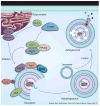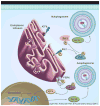Autophagy and endocrine resistance in breast cancer
- PMID: 21916582
- PMCID: PMC3701722
- DOI: 10.1586/era.11.111
Autophagy and endocrine resistance in breast cancer
Abstract
The American Cancer Society estimates that over 200,000 new breast cancer cases are diagnosed annually in the USA alone. Of these cases, the majority are invasive breast cancers and almost 70% are estrogen receptor-α positive. Therapies targeting the estrogen receptor-α are widely applied and include selective estrogen receptor modulators such as tamoxifen, a selective estrogen receptor downregulator such as Fulvestrant (Faslodex; FAS, ICI 182,780), or one of the third-generation aromatase inhibitors including letrozole or anastrozole. While these treatments reduce breast cancer mortality, many estrogen receptor-α-positive tumors eventually recur, highlighting the clinical significance of endocrine therapy resistance. The signaling leading to endocrine therapy resistance is poorly understood; however, preclinical studies have established an important role for autophagy in the acquired resistance phenotype. Autophagy is a cellular degradation process initiated in response to stress or nutrient deprivation, which attempts to restore metabolic homeostasis through the catabolic lysis of aggregated proteins, unfolded/misfolded proteins or damaged subcellular organelles. The duality of autophagy, which can be either pro-survival or pro-death, is well known. However, in the context of endocrine therapy resistance in breast cancer, the inhibition of autophagy can potentiate resensitization of previously antiestrogen resistant breast cancer cells. In this article, we discuss the complex and occasionally contradictory roles of autophagy in cancer and in resistance to endocrine therapies in breast cancer.
Figures


References
-
- Jemal A, Siegel R, Xu J, Ward E. Cancer statistics, 2010. CA Cancer J Clin. 2010;60(5):277–300. - PubMed
-
- Jemal A, Center MM, Ward E, et al. Cancer occurrence. Methods Mol Biol. 2009;471:3–29. - PubMed
-
- Parkin DM, Fernandez LM. Use of statistics to assess the global burden of breast cancer. Breast J. 2006;12(Suppl 1):S70–S80. - PubMed
-
- Clarke M, Collins R, Davies C, et al. Tamoxifen for early breast cancer: an overview of the randomised trials. Lancet. 1998;351(9114):1451–1467. - PubMed
-
- Doggrell SA. Is long-term adjuvant treatment of breast cancer with anastrozole indicated? Expert Opin Pharmacother. 2008;9(9):1619–1622. - PubMed
Website
Publication types
MeSH terms
Substances
Grants and funding
LinkOut - more resources
Full Text Sources
Medical
Research Materials
Miscellaneous
